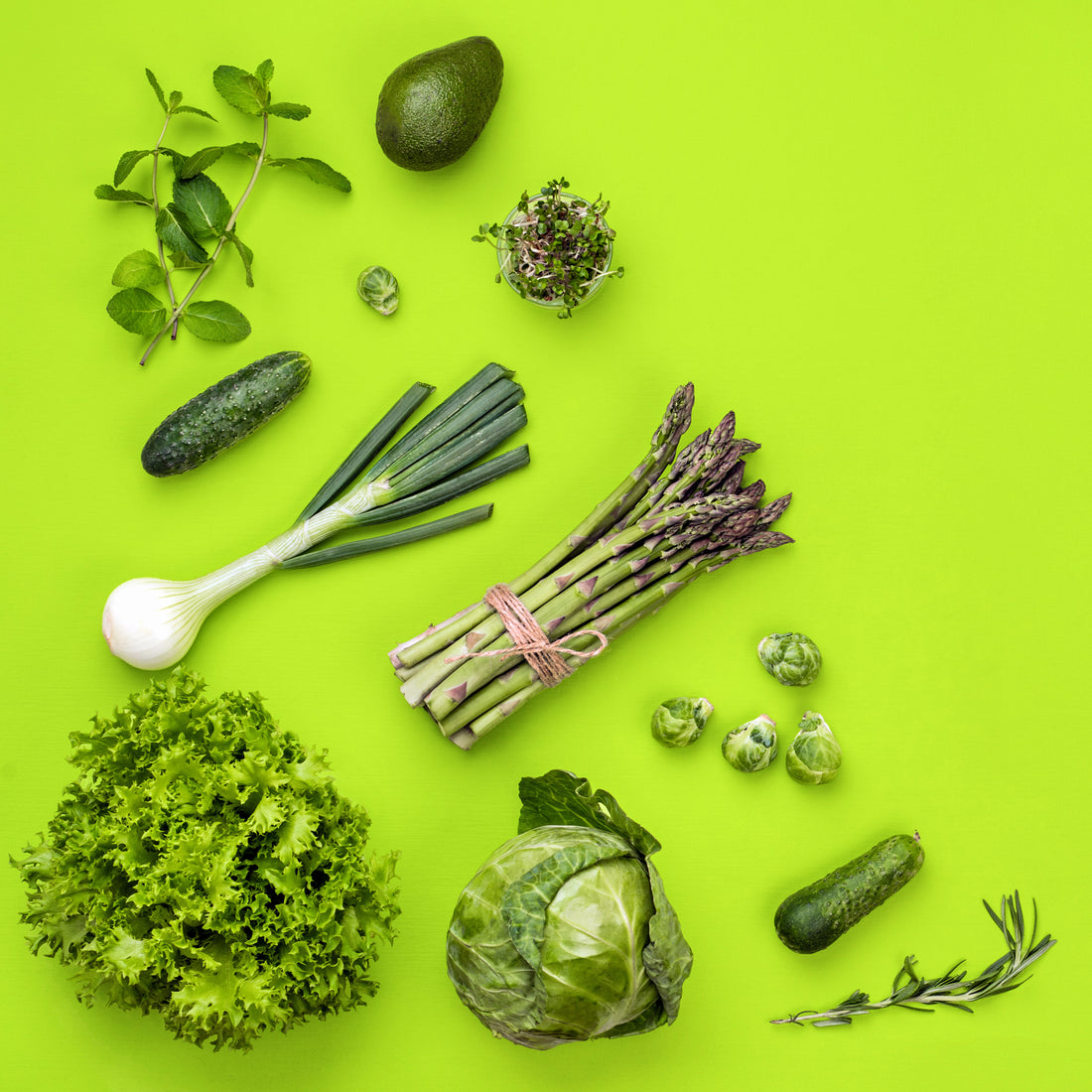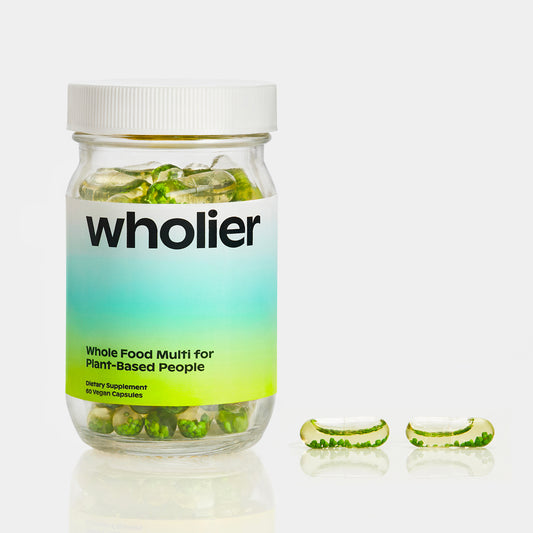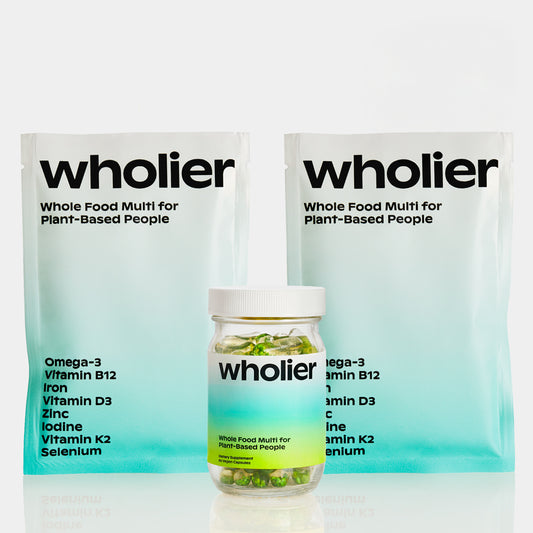
8 Supplements Vegans and Vegetarians Need to Take (Or at Least Consider Taking)
Plant-based nutritionist Alex Caspero explains the top 8 vitamins, minerals and omega-3's that vegans and vegetarians should consider supplementing. These 8 nutrients are typically harder to come by or absent in a plant-based diet.
While a plant-based diet is considered healthier for you and the planet, it needs to be both balanced and diverse in order to maximize daily nutrition. Reviews that have looked specifically at vegan and vegetarian diets show them to be richer in fiber, healthy polyunsaturated fatty acids, folate, vitamin C, vitamin E, and magnesium. The downside? The Recommended Daily Allowance (RDA) of vitamins B12 and D, iron, zinc, and some other nutrients can be harder to come by on a daily basis. The challenge: Most multivitamins in the supplement aisle are created for meat eaters and contain nutrients that are already abundant in a plant-based diet, but lack those that plant-eaters need more help with.
Below are the top 8 nutrients that can be harder to intake enough of on a daily basis if you follow a plant-based diet. They should be in your daily multivitamin or part of your daily supplementation routine and at top of mind while meal planning.
Most multivitamins in the supplement aisle are created for meat eaters and contain nutrients that are already abundant in a plant-based diet, but lack those that plant-eaters need more help with. A multivitamin for vegans or vegetarians needs to consider the unique nutrient gaps in these diets.
1. DHA + EPA Omega-3 Fatty Acids
DHA (docosahexaenoic acid) and EPA (eicosapentaenoic acid) are both long-chain omega-3 fatty acids. They’re found mostly in fatty fish and, to a lesser extent, in eggs and seaweed. We can also produce both DHA and EPA by consuming ALA (alpha-linolenic acid), a short-chain omega-3 fatty acid found mostly in soy, walnuts, canola oil, flaxseeds, hemp seeds, and chia seeds (1).
Unlike DHA and EPA, ALA is considered an essential fatty acid as we cannot make it ourselves. However, the conversion of ALA to DHA and EPA is low and based on several factors, including overall diet and age.
Because DHA (and to a lesser extent, EPA) may possibly play a role in chronic disease prevention—especially cardiovascular disease, cognitive decline and depression—vegans and those who don’t consume fatty fish regularly should supplement with an algae-based DHA supplement to meet needs.
2. Vitamin K2
Vegans tend to get abundant amounts of vitamin K1 through leafy green consumption. However, vitamin K2 is found primarily in animal-derived foods, fermented natto, or produced by bacteria. Vitamin K is essential for blood clotting, heart health and bone health, and some have suggested that K2 specifically is more beneficial for both bone and heart health, but more controlled trial research is needed. One study found that older women who consumed K2 experienced significantly decreased age-related bone loss compared to those who didn’t (2).
3. Iron
Iron is plentiful in plant foods, however, it is non-heme iron, which means it is harder for your body to absorb than the heme iron form that’s found in meat. To increase iron absorption, it’s recommended to add vitamin C at meals (e.g, strawberries, bell peppers, citrus fruits, broccoli) and to avoid tea and coffee within an hour of an iron-rich meal. Because of the way that calcium and iron compete for absorption, a multivitamin containing iron should be taken away from a calcium-rich meal or a calcium supplement. This is why wholier’s calcium supplement is not in the Multi for Plant-Based People, meant to be taken first thing in the morning, but included in Night Minerals: Plant-Based Magnesium + Calcium.
Because of these absorption considerations with iron, the Institute of Medicine recommends that vegans consume higher amounts of iron than the RDA — around 1.8 times more than non-vegans. To ensure adequate intake, especially for premenopausal women, supplementing with some iron can help meet needs (3).
4. Iodine
Iodine is required for a healthy thyroid, essential for the formation of the thyroid hormones thyroxine and triiodothyronine (T3). Iodine is also important in regulating normal metabolism (4). It is only consistently found in a few foods: iodized salt, seaweed, seafood, and dairy products. Note that dairy doesn’t naturally contain high levels of iodine—it’s present because of the iodized solutions used to clean equipment as well as iodine supplements that are specifically given to livestock.
In plant foods, iodine amounts are inconsistent and depend on the iodine content of the soil in which they’re grown. Food grown close to the ocean tends to be higher in iodine. Because low iodine intake is common for most of the population, iodine is added to some salt and consuming iodized salt is one of the safest and most effective methods for boosting iodine intake for the public (5).
Iodine is a goldilocks nutrient—meaning that don’t want too little or too much, but just the right amount, as excess iodine is also problematic and can lead to hyperthyroidism. Levels at roughly half of the RDA are a safe way to ensure adequate intake from both supplementation and food, including iodized salt.
5. Vitamin D
Vitamin D is essential for bone health and immune function, along with reducing the risk of some chronic diseases like arthritis, diabetes, blood pressure, psoriasis and more (6).
While you can get vitamin D through direct sunlight exposure to your skin, factors like geographic location, skin pigmentation, and duration of exposure can all affect how much sunlight you are able to convert to vitamin D.
Fortified milks, including non-dairy milk, fortified margarine, fatty fish, and some eggs (if chickens have been fed vitamin D) are dietary vitamin D sources. But a vegan diet contains little, if any, vitamin D without fortified foods or supplementation. Vitamin D may be more important for bone health in those with lower calcium intake, which can be more common in vegan diets than diets with large amounts of calcium (7).
There are two types of vitamin D supplements: Vitamin D3 (cholecalciferol) and Vitamin D2 (ergocalciferol). Vitamin D3 is the form of vitamin D produced in the skin when exposed to UV rays. Especially in large doses, studies show that vitamin D3 is much more effective than D2 at raising and maintaining vitamin D levels (8). While vitamin D3 is typically derived from animals, usually from the oil produced by sheep’s wool (called lanolin) or fish oil, there are vegan D3 sources available in some supplements like wholier’s multivitamin.
Studies show that vitamin D3 is much more effective than D2 at raising and maintaining vitamin D levels.
6. Selenium
Selenium is essential for DNA synthesis and thyroid hormone metabolism. The amount of selenium in food varies greatly based on selenium content of the soil (9). In areas of the world where soil selenium is low, lower blood concentrations of selenium have been reported in vegans and vegetarians (10).
Vegans who consume a variety of foods, including whole grains and beans, likely get enough selenium though it may be helpful to consume a multivitamin supplement that contains modest amounts to ensure adequate intake.
7. Vitamin B12
Vitamin B12 is arguably the most important nutrient for vegans and vegetarians. Found in meat, dairy and eggs, there are no reliable plant sources of B12. The good news is that B12 is made from bacteria which allows vegans to get enough B12 through a combination of supplements and fortified foods (11).
Unlike other micronutrients, B12 requires a protein called Intrinsic Factor (IF) to maximize absorption and only so much B12 can be absorbed at one time, about 1.5-2 mcg at a time (12). Therefore, higher doses than the RDA are needed in supplements. A 150 mcg dose of B12 results in ~2.4 mcg of absorption. As B12 is a water-soluble vitamin, meaning the body doesn’t store excess amounts, very large doses are considered safe and there is no upper limit for how much you are able to take at one time. That said, there’s no need to pay for extra B12 if you don’t need it. For most vegan adults, 150 mcg a day is enough to maintain adequate B12 levels.
With vitamin B12 supplements, higher doses than the recommended daily intake (the Daily Value on Supplement Facts panels) are need due to the low absorption rate: A 150 mcg dose of B12 results in ~2.4 mcg of absorption.
8. Zinc
As with iron, vegans tend to meet the RDA for zinc but because of absorption concerns, some vegans may need more than the RDA. Zinc is essential in DNA production, protein metabolism and supporting a healthy immune system (13).
Zinc is found in many plant foods, highest in oatmeal, cashews, tofu, sunflower seeds, and beans. However, because compounds called phytates found in plant foods can bind to and reduce zinc absorption, some researchers have suggested that vegans need 50% more zinc to account for this (14). A vegan multivitamin that contains at least half of the RDA for zinc can help.
It’s shouldn’t be a hard pill to swallow.
Multivitamins can be a good option for anyone seeking some additional vitamin and mineral support in their diet. For people who follow a plant-based lifestyle, it’s important to choose a multivitamin that provides not only potential micronutrients of concern, but these nutrients in adequate amounts to help meet vegan and vegetarian needs.
Sources:
(1) Burdge GC, Wootton SA. Conversion of alpha-linolenic acid to eicosapentaenoic, docosapentaenoic and docosahexaenoic acids in young women. Br J Nutr. 2002 Oct;88(4):411-20.
(2) Knapen, 2013. Knapen MH, Drummen NE, Smit E, Vermeer C, Theuwissen E. Three-year low-dose menaquinone-7 supplementation helps decrease bone loss in healthy postmenopausal women. Osteoporos Int. 2013 Sep;24(9):2499-507.
(3) Institute of Medicine. Food and Nutrition Board. Dietary Reference Intakes for Vitamin A, Vitamin K, Arsenic, Boron, Chromium, Copper, Iodine, Iron, Manganese, Molybdenum, Nickel, Silicon, Vanadium, and Zinc. Washington, DC: National Academy Press, 2001.
(4) National Institutes of Health (NIH) Office of Dietary Supplements. Iodine Fact Sheet for Health Professionals. Updated May 1, 2020. Accessed July 3, 2020.
(5) Leung AM, Braverman LE, Pearce EN. History of U.S. iodine fortification and supplementation. Nutrients. 2012 Nov 13;4(11):1740-6.
(6) Schwalfenberg G. Not enough vitamin D: health consequences for Canadians. Can Fam Physician. 2007 May;53(5):841-54.
(7) Feskanich D, Willett WC, Colditz GA. Calcium, vitamin D, milk consumption, and hip fractures: a prospective study among postmenopausal women. Am J Clin Nutr. 2003 Feb;77(2):504-11.
(8) Tripkovic L, Lambert H, Hart K, Smith CP, Bucca G, Penson S, Chope G, Hyppönen E, Berry J, Vieth R, Lanham-New S. Comparison of vitamin D2 and vitamin D3 supplementation in raising serum 25-hydroxyvitamin D status: a systematic review and meta-analysis. Am J Clin Nutr. 2012 Jun;95(6):1357-64
(9) Rayman MP. Selenium and human health. Lancet 2012;379:1256-68.
(10) Mangels R, Messina V, Messina M. The Dietitian’s Guide to Vegetarian Diets, 3rd ed. Sudbury, MA: Jones & Bartlett Learning, 2011.
(11) Pawlak R, Lester SE, Babatunde T. The prevalence of cobalamin deficiency among vegetarians assessed by serum vitamin B12: a review of literature [published correction appears in Eur J Clin Nutr. 2016 Jul;70(7):866]. Eur J Clin Nutr. 2014;68(5):541-548. doi:10.1038/ejcn.2014.46
(12) Chanarin I. Absorption of cobalamins. J Clin Pathol Suppl (R Coll Pathol). 1971;5:60–5. PMCID: PMC1176261.
(13) https://lpi.oregonstate.edu/mic/minerals/zinc
(14) Institute of Medicine. Food and Nutrition Board. Dietary Reference Intakes for Vitamin A, Vitamin K, Arsenic, Boron, Chromium, Copper, Iodine, Iron, Manganese, Molybdenum, Nickel, Silicon, Vanadium, and Zinc. (2001)





